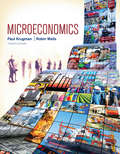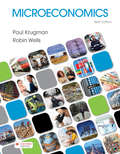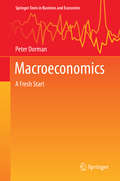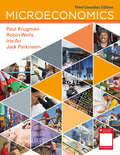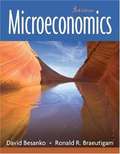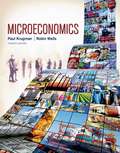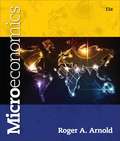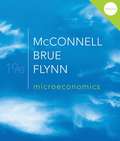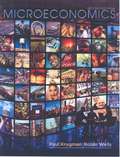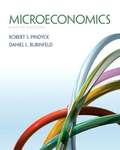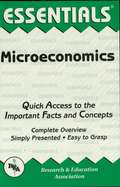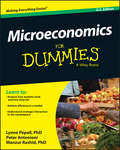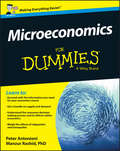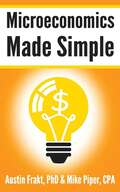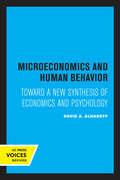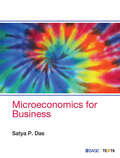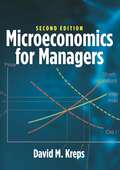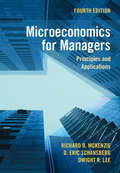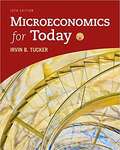- Table View
- List View
Microeconomics
by Michael ParkinGet students to think like economists using the latest policy and data while incorporating global issues. Microeconomics, 13th Edition builds on the foundation of the previous edition and retains a thorough and careful presentation of the principles of economics. The text emphasizes real-world applications, the development of critical-thinking skills, diagrams renowned for their pedagogy and clarity, and path-breaking technology. As a hallmark, features in the chapter openings and endings encourage students to think critically about a news article relating to the issue, demonstrating how thinking like an economist can bring a clearer perspective and deeper understanding of today’s events.
Microeconomics
by Paul Krugman Robin WellsWhen it comes drawing on enduring economic principles to explain current economic realities, there is no one readers trust more than Paul Krugman. With his bestselling introductory textbook (now in a new edition) the Nobel laureate and New York Times columnist is proving to be equally effective in the classroom, with more and more instructors in all types of schools using Krugman's signature storytelling style to help them introduce the fundamental principles of economics to all kinds of students.
Microeconomics
by Paul Krugman Robin WellsWith its signature storytelling style and coverage of current issues and events, Nobel laureate and New York Times columnist Paul Krugman and co-author, Robin Wells�s best-seller is the most effective textbook available for explaining how economic concepts play out in our world.This new edition offers incisive new insight into market power and externalities in microeconomics, updated analysis of long-run growth, and extensive coverage of the economic impacts and policy responses to the coronavirus pandemic in macroeconomics
Microeconomics
by Paul Krugman Robin WellsKrugman/Wells uses a storytelling style and current events to help you understand how economic concepts play out in our world.
Microeconomics
by Peter DormanFocused on Dhaka, and applicable to other cities, this book uses geospatial techniques to explore land use, climate variability, urban sprawl, population density modeling, flooding, water quality, urban growth modeling, infectious disease and quality of life.
Microeconomics (3rd Canadian Edition)
by Paul Krugman Robin Wells Iris Au Jack ParkinsonEngaging Students in the Study of Economics: We are committed to the belief that students learn best from a complete textbook program built around narratives, steeped in real life and current events, with a strong emphasis on global matters and with proven technology that supports student success. Narrative Approach: This is a textbook built around narratives and stories, many pulled from real life. In every chapter, stories are used to teach core concepts and motivate learning. We believe that the best way to introduce concepts and reinforce them is through memorable, real-world stories; students simply relate more easily to them. Global Focus: This book is unrivaled in the attention paid to global matters. We have thoroughly integrated an international perspective into the text, in the numerous applications, cases, and stories and, of course, in the data-based Global Comparison feature. Technology That Builds Success: Microeconomics is not just a textbook. It has evolved to become a complete program with interactive features designed and built to extend the goals of the text. This program encourages even stronger student engagement, mastery of the material, and success in the course.
Microeconomics (3rd edition)
by David A. Besanko Ronald R. BraeutigamBesanko and Braeutigam present the concepts and theory of microeconomics in a style that enables the reader to learn and experience it. The authors include numerous fully worked-out problems that provide a step-by-step road map to help them solve numerical problems. In addition, extensive real-world examples are integrated throughout the chapters that show contemporary applications of the theory. Each chapter also opens with an engaging example to draw readers into the material.
Microeconomics (4th Edition)
by Paul Krugman Robin WellsWhen it comes to explaining fundamental economic principles by drawing on current economic issues and events, there is no one more effective than Nobel laureate and New York Times columnist Paul Krugman and co-author, Robin Wells. In this best-selling introductory textbook, Krugman and Wells' signature storytelling style and uncanny eye for revealing examples help readers understand how economic concepts play out in our world. This new edition is revised and enhanced throughout, including a much stronger array of superior online tools that are part of a complete, integrated online learning system.
Microeconomics (Eleventh Edition)
by Roger A. ArnoldIn this edition, the author intends to provide a comprehensive coverage of the financial and economic crisis available in principles of economics text with new sections on the future of Social Security, Medicare and Medicaid, framing, and neuroeconomics.
Microeconomics (Fifth Edition)
by Paul Krugman Robin WellsPaul Krugman and Robin Wells’ signature storytelling style helps readers understand how economic concepts play out in our world. The new edition, revised and enhanced throughout, now offers holistic digital learning tools as part of SaplingPlus, a complete, integrated online learning system. <p><p> This new edition is revised and enhanced throughout, including a much stronger array of superior online tools that are part of a complete, integrated online learning system.
Microeconomics (Nineteenth Edition)
by Stanley L. Brue Campbell Mcconnell Sean Masaki FlynnMcConnell, Brue, and Flynn' s Economics: Principles, Problems, and Policies is the #1 Principles of Economics textbook in the world. It continues to be innovative while teaching students in a clear, unbiased way. The 19th Edition builds upon the tradition of leadership by sticking to 3 main goals: Help the beginning student master the principles essential for understanding the economizing problem, specific economic issues, and the policy alternatives; help the student understand and apply the economic perspective and reason accurately and objectively about economic matters; and promote a lasting student interest in economics and the economy. Connect is the only integrated learning system that empowers students by continuously adapting to deliver precisely what they need, when they need it, and how they need it, so that your class time is more engaging and effective.
Microeconomics (Sixth Edition)
by R. Glenn Hubbard Anthony Patrick O'BrienThe Relevance of Economics Through Real-world Business Examples <P><P>One of the challenges of teaching Principles of Microeconomics is fostering interest in concepts that may not seem applicable to students’ lives. Microeconomics with MyEconLab makes economics relevant by demonstrating how real businesses use economics to make decisions every day. And with an ever changing U.S. and world economy, the Sixth Edition has been updated with the latest developments using new real-world business and policy examples. Regardless of their future career path–opening an art studio, trading on Wall Street, or bartending at the local pub–students will benefit from understanding the economic forces behind their work.
Microeconomics 2nd Edition
by Paul Krugman Robin WellsThe product of the partnership of coauthors Krugman and Robin Wells, the book returns in a new edition. The new edition is informed and informative, solidly grounded in economic fundamentals yet focused on the realities of today's world and the lives of students. It maintains the signature Krugman/Wells story-driven approach while incorporating organizational changes, new content and features, and new media and supplements.
Microeconomics Eighth Edition
by Robert S. Pindyck Daniel L. RubinfeldA book that provides a treatment of microeconomic theory that stresses the relevance and application to managerial and public policy decision making.
Microeconomics Essentials
by The Editors of REAREA's Essentials provide quick and easy access to critical information in a variety of different fields, ranging from the most basic to the most advanced. As its name implies, these concise, comprehensive study guides summarize the essentials of the field covered. Essentials are helpful when preparing for exams, doing homework and will remain a lasting reference source for students, teachers, and professionals. Microeconomics includes the fundamentals of supply and demand, consumer theory, production, perfect competition, the monopoly, and factor prices.
Microeconomics For Dummies
by Peter Antonioni Manzur Rashid Lynne PepallYour no-nonsense guide to microeconomics The study of microeconomics isn't for the faint of heart. Fortunately, Microeconomics For Dummies is here to help make this tough topic accessible to the masses. If you're a business or finance major looking to supplement your college-level microeconomics coursework--or a professional who wants to expand your general economics knowledge into the microeconomics area--this friendly and authoritative guide will take your comprehension of the subject from micro to macro in no time! Cutting through confusing jargon and complemented with tons of step-by-step instructions and explanations, it helps you discover how real individuals and businesses use microeconomics to analyze trends from the bottom up in order to make smart decisions. Snagging a job as an economist is fiercely competitive--and highly lucrative. Having microeconomics under your belt as you work toward completing your degree will put you head and shoulders above the competition and set you on the course for career advancement once you land a job. So what are you waiting for? Analyze small-scale market mechanisms Determine the elasticity of products within the market systems Decide upon an efficient way to allocate goods and services Score higher in your microeconomics class Everything you need to make microeconomics your minion is a page away!
Microeconomics For Dummies (UK Edition)
by Peter Antonioni Manzur RashidYour one-stop guide to understanding Microeconomics Microeconomics For Dummies (with content specific to the UK reader) is designed to help you understand the economics of individuals. Using concise explanations and accessible content that tracks directly to an undergraduate course, this book provides a student-focused course supplement with an in-depth examination of each topic. This invaluable companion provides clear information and real-world examples that bring microeconomics to life and introduces you to all the key concepts. From supply and demand to market competition, you'll understand how the economy works on an individual level, and how it affects you every day. Before long, you'll be conversant in consumers, costs, and competition. Microeconomics is all about the behaviour of individual people and individual firms. It sounds pretty straightforward, but it gets complicated early on. You may not be an economist, but if you're a business student at university, the odds are you need to come to grips with microeconomics. That's where Microeconomics For Dummies comes in, walking you through the fundamental concepts and giving you the understanding you need to master the material. Understand supply, demand, and equilibrium Examine the consumer decision making process Delve into elasticity and costs of production Learn why competition is healthy and monopolies are not Even the brightest business students can find economics intimidating, but the material is essential to a solid grasp of how the business world works. The good news is that you've come to the right place.
Microeconomics Made Simple: Basic Microeconomic Principles Explained in 100 Pages
by Austin Frakt Mike PiperMicroeconomics Made Simple: Basic Microeconomic Principles Explained in 100 Pages or Less (Financial Topics in 100 Pages or Less)
Microeconomics and Human Behavior: Toward a New Synthesis of Economics and Psychology
by David A. AlhadeffThis title is part of UC Press's Voices Revived program, which commemorates University of California Press’s mission to seek out and cultivate the brightest minds and give them voice, reach, and impact. Drawing on a backlist dating to 1893, Voices Revived makes high-quality, peer-reviewed scholarship accessible once again using print-on-demand technology. This title was originally published in 1982.
Microeconomics for Business (SAGE Texts)
by Satya P DasThis book breaks away from standard microeconomics textbooks for management students in numerous ways. Some of its relevant and useful features are: · A strong emphasis on concepts, their explanation, understanding and application · Graphical and logical derivations supplemented by economic intuition in easy-to-understand English, while retaining the rigour of algebraic treatment · Numerous real-life examples, largely pertaining to India · Two unique chapters: Demand for Assets and Game Theory and Economic Applications · Questions at the end of each chapter, emphasising the application of concepts This book will be valuable for BBA and B.Com. students and also for those pursuing Managerial Economics at the Masters level.
Microeconomics for MBAs
by Dwight R. Lee Richard B. MckenzieThe textbook that develops the economic way of thinking through problems that MBA students will find relevant to their career goals. Theory and math is kept as simple as possible and illustrated with real-life scenarios. This textbook package includes online video tutorials on key concepts and complex arguments, and topics likely to be assessed in exams. The distinguished author team has developed this textbook over 20 years of teaching microeconomics to MBA students. Chapters are clearly structured to support learning: Part I of each chapter develops key economic principles. Part II draws on those principles to discuss organizational and incentive issues in management and focuses on solving the 'principal-agent' problem to maximize the profitability of the firm - lessons that can be applied to problems MBAs will face in the future. Economics and management are treated equally; this unique textbook presents economics as part of the everyday thinking of business people.
Microeconomics for MBAs
by Dwight R. Lee Richard B. Mckenzie McKenzie, Richard B. and Lee, Dwight R.The textbook that develops the economic way of thinking through problems that MBA students will find relevant to their career goals. Theory and math is kept as simple as possible and illustrated with real-life scenarios. This textbook package includes online video tutorials on key concepts and complex arguments, and topics likely to be assessed in exams. The distinguished author team has developed this textbook over 20 years of teaching microeconomics to MBA students. Chapters are clearly structured to support learning: Part I of each chapter develops key economic principles. Part II draws on those principles to discuss organizational and incentive issues in management and focuses on solving the 'principal-agent' problem to maximize the profitability of the firm - lessons that can be applied to problems MBAs will face in the future. Economics and management are treated equally; this unique textbook presents economics as part of the everyday thinking of business people.
Microeconomics for Managers
by David M. KrepsThis is a thoroughly revised and substantially streamlined new edition of a leading textbook that shows MBA students how understanding economics can help them make smarter and better-informed real-world management decisions. David Kreps, one of the world’s most influential economists, has developed and refined Microeconomics for Managers over decades of teaching at Stanford’s Graduate School of Business. Stressing game theory and strategic thinking and driven by in-depth, integrated case studies, the book shows future managers how economics can provide practical answers to critical business problems.
Microeconomics for Managers: Principles and Applications
by Richard B. McKenzie D. Eric Schansberg Dwight R. LeeThis fully updated fourth edition explores microeconomic concepts, with a distinctive emphasis on 'the economic way of thinking' and its applicability to sharp managerial thinking, productivity, and good decision-making. It stands apart due to its strong focus on practical and applied knowledge from the business context and its unique structure (Part I of each chapter develops key economic principles; Part II draws on those principles to discuss organizational and incentive issues in management, focusing on solving the 'principal-agent' problem to maximize the profitability of the firm). There are plentiful real-life scenarios and provocative examples in each chapter. Accessible to MBA students, other graduate students and undergraduates, it is ideal as a core text for courses in Managerial Economics. Requiring an understanding of only basic algebra, this new edition is more concise with a wealth of online resources, including additional online chapters and an online appendix with more advanced mathematical applications.
Microeconomics for Today
by Irvin B. TuckerThe most reader-friendly economics approach available, MICROECONOMICS FOR TODAY, 10E by national award-winning educator Irvin Tucker presents Macro and Micro economic concepts using a writing style that is both engaging and clear, no matter what your current level of economic understanding. <p><p> A unique presentation and visual learning system, colorful graphs, and Causation Chains clarify and illustrate important economic principles. The book concisely presents and reinforces core concepts, while online resources immediately facilitate assessment of understanding, and will study the latest information on economic growth, income distribution, federal deficits, environmental issues, and other developments in economics today. <p><p> The book's easy-to-follow format demonstrates how to apply principles to your everyday life, while numerous printed and digital study tools help you further master key current economic principles.

